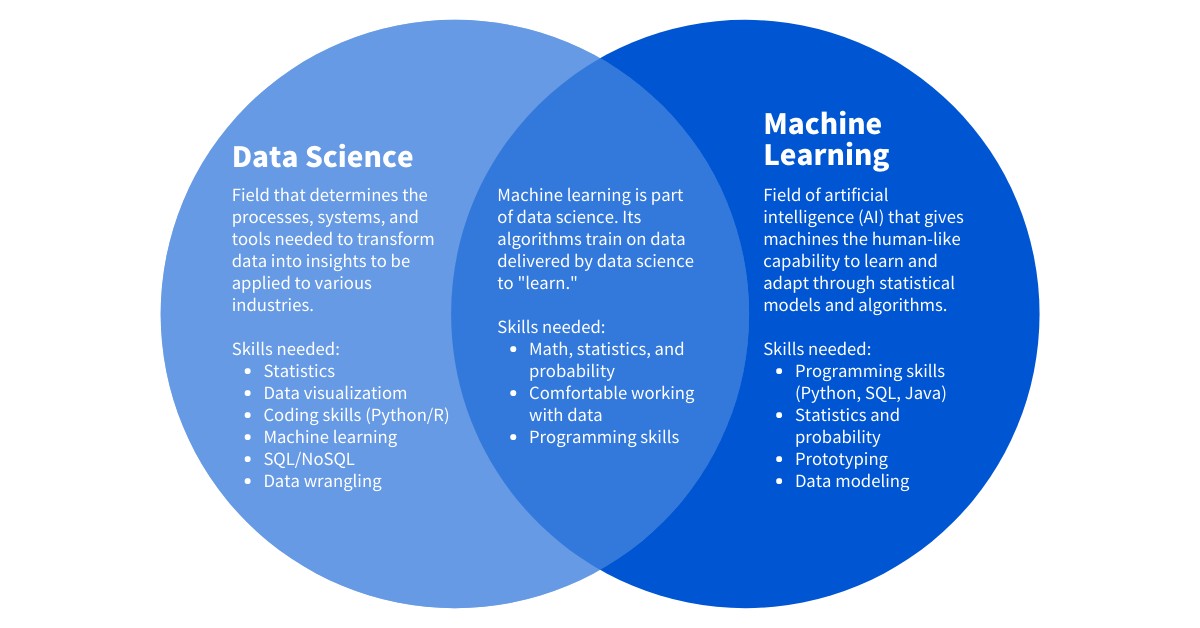Data science and machine learning are revolutionizing industries by leveraging data for innovation. While often used interchangeably, they represent distinct yet interconnected concepts. This article delves into the core of “What Is Machine Learning In Data Science,” exploring its significance, applications, and relationship with the broader field of data science.
 Venn diagram comparing Data Science vs Machine Learning
Venn diagram comparing Data Science vs Machine Learning
Machine Learning: A Subset of Data Science
Data science encompasses the entire process of extracting knowledge and insights from data, encompassing various techniques like data collection, cleaning, analysis, and visualization. Machine learning, a subset of artificial intelligence, falls within this spectrum, focusing on algorithms that enable systems to learn from data without explicit programming. It automates analytical model building, allowing computers to identify patterns, make predictions, and improve their performance over time based on the data they are exposed to.
How Machine Learning Powers Data Science
Machine learning plays a crucial role in modern data science by automating complex analytical tasks. It empowers data scientists to:
- Analyze large datasets: Machine learning algorithms efficiently process massive volumes of data, identifying intricate patterns that would be impossible to discern manually.
- Predict future trends: Based on historical data, machine learning models forecast future outcomes, enabling businesses to make informed decisions.
- Automate decision-making: Machine learning algorithms can be integrated into systems to automate decisions based on real-time data analysis.
Examples of Machine Learning in Data Science
The applications of machine learning in data science are vast and continually expanding. Here are some prominent examples:
- Recommendation systems: Platforms like Netflix and Amazon utilize machine learning to personalize user experiences by suggesting relevant products or content.
- Fraud detection: Financial institutions employ machine learning algorithms to identify fraudulent transactions based on patterns of suspicious activity.
- Medical diagnosis: Machine learning models assist medical professionals in diagnosing diseases by analyzing patient data and identifying potential risks.
Skills Needed for Machine Learning in Data Science
Proficiency in both data science and machine learning requires a strong foundation in:
- Programming languages: Python and R are commonly used for machine learning tasks.
- Statistical modeling: Understanding statistical concepts is crucial for building and evaluating machine learning models.
- Machine learning algorithms: Familiarity with various algorithms like linear regression, decision trees, and neural networks is essential.
Career Paths in Machine Learning
The demand for professionals skilled in machine learning is rapidly growing. Career options include:
- Machine Learning Engineer: Develops and implements machine learning models for various applications.
- Data Scientist: Utilizes machine learning techniques to extract insights from data and solve complex business problems.
- AI Researcher: Conducts research to advance the field of machine learning and artificial intelligence.
Conclusion
Machine learning is a powerful tool within the broader field of data science, enabling the analysis of vast datasets, the prediction of future trends, and the automation of decision-making. As data continues to proliferate, the importance of machine learning in extracting meaningful insights and driving innovation will only continue to grow. Aspiring data scientists should develop a strong understanding of machine learning principles and techniques to thrive in this dynamic field. Consider exploring online courses and specializations in machine learning to build your skills and prepare for a rewarding career in this cutting-edge domain.